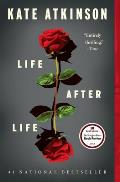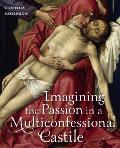Uncategorized | July 11, 2016
Summer Reading: Marías, Mondéjar, and the Medieval
Today, the Missouri Review presents the sixth installment of the Summer Reading series, designed to provide recommendations for summer reads from authors and Missouri Review staff members. This installment is written by Cynthia Robinson. Her story “Maison des Oiseaux” appears in the Summer 2016 issue.

“Santa María la Antigua”” by Emilio García is licensed under CC BY 2.0
On this late afternoon in the middle of a bizarrely cold June I am reading, in Spain, and in Spanish. At a rickety little table in a corner cafe stuck into the ground floor of a very old building, its facade studded with those bird-cage-y miradors that make you want to put on a black mantilla and gaze languidly down at the street from behind your fan. I am gazing over Valladolid’s Plaza Mayor, awash with after-rainstorm sun: it looks like it jumped straight out of Fernando Trueba’s delicious 1994 Oscar-Winner, Belle Époque.
For afternoon reading, I need coffee, and Spanish coffee is the best coffee in Europe. And even better, a splash of brandy has turned my café cortado (okay, macchiato) into something known as a carajillo. A carajillo is the perfect accompaniment to Javier Marías’ latest novel, Los enamoramientos (rendered not entirely satisfactorily as Infatuations on the cover of Margaret Jull Costa’s otherwise brilliant translation). Like carajillos and plazas, Marías, even when he writes about La Habana or  Manhattan or Oxford, conjures Old Madrid. His characters are not constantly engaged with their smart phones: even though they live in some never explicitly identified ‘present’ that always manages to seem like now, they also feel old. Old is familiar, and familiar, to me, this summer, feels good. My selections are, I guess, for lovers of Spain and its language.
Manhattan or Oxford, conjures Old Madrid. His characters are not constantly engaged with their smart phones: even though they live in some never explicitly identified ‘present’ that always manages to seem like now, they also feel old. Old is familiar, and familiar, to me, this summer, feels good. My selections are, I guess, for lovers of Spain and its language.
In my day job I am a medievalist, so if I am 100% honest, at least 50% of the reading material I will consume this summer is comprised of random and very old pieces of paper, scrawled in the frustratingly ornate script known as “letra cortesana,” used by public notaries and their ilk. These bits and pieces of the past are housed at Simancas, some seven miles from Valladolid, in a big, drafty old castle turned into a state archive by King Ferdinand and Queen Isabel. The objects of this summer’s quest are documents relating to properties lavished in the 1460s by the aging Sultan of Granada, known popularly as “Muley Hacén,” upon a young Christian captive named Isabel de Solís, also known as la Zoraya, from the Arabic al-zahrā’, the name given to her when she converted to Islam, best translated as “Splendorous.” In real-life echo of medieval romances like Fleur et Blanchefleur, Isabel was kidnapped by Muslim raiders during her tender years while drawing water from a well. Stockholm Syndrome may or may not have played a role in her long relationship with Muley Hacén, during which she gave birth to two sons and became a very rich woman.
The documents and the archive are for the mornings; afternoons are for trysting with fiction. La Zoraya’s story is racy stuff: Los enamoramientos would have to be exceptionally good to compete, and it does. It’s classic Marías, albeit with the new twist of a female, first-person narrator ,María, who wrestles with all of the tough stuff Marías always foists upon his characters: complicated, contradictory love; death under suspicious circumstances in which bizarre happenstance has also played a role—in this case, a series of chance encounters, over a period of years, in one of the neighborhood cafeterías in which most of Spain has breakfast. To readers of Marías, Los enamoramientos will be both new and familiar: the subtle, insistent, Lady-Macbeth-like whisper into the ear, maybe while sharing a pillow, that gets us to do things we shouldn’t; slightly unhinged, weirdly sympathetic and very unlikely hit-men; a highly intelligent, self-deprecating narrator who rambles about what-ifs and moral quandaries and makes us not only listen but love it.
Some of my friends have grumbled about Los enamoramientos being yet another turn to the screw of Marías’ “usual misogyny,” and they are not entirely wrong; if misogyny-in-literature bothers you a lot, maybe skip straight to the second book sitting at my elbow. Cada noche, cada noche is the latest offering from friend-of-a-friend, feminist and psychoanalyst Lola López Mondéjar. If there were an English translation, it might be Every Night. There is not a translation, however, and at the moment I know of no plans for there to be one, even though López Mondéjar’s work is every bit as deserving of translation as Marías’. This could take us very quickly back to the topic of gender. In Cada noche, cada noche, a daughter, whose own life has been barren in terms of sexual desire, discovers that her terminally ill mother, who has made the decision to end her life in Switzerland, in a clinic established for this purpose, almost certainly served Nabokov as inspiration for his Lolita. The daughter, even as she helps her mother die, goes looking for answers.
López Mondéjar’s protagonists are strong women, badly damaged but not broken, often searching for a way to be in the world without men, or at least without men-as-patriarchs, even though they themselves may be initially unaware of this quest. Of Lola’s oeuvre, I first read Mi amor desgraciado—‘My unfortunate love’ (also untranslated)—from cover to cover in one sitting, on a flight home from Madrid. Though the writing makes you want to savor every beautiful word, the book is truly un-put-down-able. Lola’s short stories are also very much worth a read, even if your Spanish isn’t quite up to it. The best inspiration for practicing a language is desperately wanting to read something. Lazos de sangre—“Blood ties”—is her most recent collection.
And now it’s confession time: maybe I especially love reading Lola because, not only is  she a brilliant writer, but I’ve shared meals and glasses of wine with her, been to her readings, had conversations with her about books, and about writing. I know how long and how hard she had to fight to get her first novel published, because she told me. Maybe by seeking out the familiar this summer—I’ve also headed back into Kate Atkinson, way before Life After Life, even further back than Case Histories, all the way to Emotionally Weird and Human Croquet, so that I can watch one of my most revered writers “make” herself on rewind—what I’m really doing is reaching for my own brand of comfort food for the soul. Because, what do you give yourself to read while you live the agony of Novel on Submission? Answer: what you know and what you love. The things that made you want to write in the first place.
she a brilliant writer, but I’ve shared meals and glasses of wine with her, been to her readings, had conversations with her about books, and about writing. I know how long and how hard she had to fight to get her first novel published, because she told me. Maybe by seeking out the familiar this summer—I’ve also headed back into Kate Atkinson, way before Life After Life, even further back than Case Histories, all the way to Emotionally Weird and Human Croquet, so that I can watch one of my most revered writers “make” herself on rewind—what I’m really doing is reaching for my own brand of comfort food for the soul. Because, what do you give yourself to read while you live the agony of Novel on Submission? Answer: what you know and what you love. The things that made you want to write in the first place.
Cynthia Robinson’s short fiction has appeared or is forthcoming in the Arkansas Review, Bayou, Epoch, the Louisville Review, the Pinch, the New Southerner, Slice, and Stone Canoe. She has a novel under representation and a second under way. Cynthia lives with two rescued rabbits in Ithaca, New York. She is the Mary Donlon Alger Professor of Medieval and Islamic Art at Cornell University, where she also chairs the Department of the History of Art.
Cynthia is also the author of Imagining the Passion in a  Multiconfessional Castile: The Virgin, Christ, Devotions, and Images in the Fourteenth and Fifteenth Centuries, another summer reading option for those fascinated by Spain and the medieval.
Multiconfessional Castile: The Virgin, Christ, Devotions, and Images in the Fourteenth and Fifteenth Centuries, another summer reading option for those fascinated by Spain and the medieval.
SEE THE ISSUE
SUGGESTED CONTENT

Poem of the Week
Jan 22 2024
“Grace” by Becca Klaver
This week’s Poem of the Week is “Grace” by Becca Klaver. Becca Klaver is the author of the poetry collections LA Liminal (Kore), Empire Wasted (Bloof), and Ready for the… read more

Poem of the Week
Jan 15 2024
“Ravens Flying” by Kai Carlson-Wee
This week’s Poem of the Week is “Ravens Flying” by Kai Carlson-Wee. Kai Carlson-Wee is the author of RAIL (BOA Editions, 2018). He received his MFA from the University of… read more

Poem of the Week
Jan 08 2024
“Collision of Light and Dark” by Allison C. Macy-Steines
This week’s Poem of the Week is “Collision of Light and Dark” by Allison C. Macy-Steines. Allison C. Macy-Steines writes both prose and poetry, and she is passionate about bending… read more


